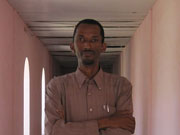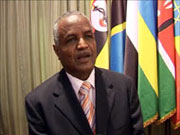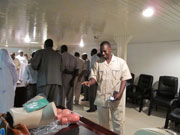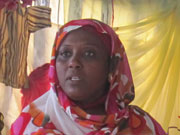Project News
2011-08-18
Voices on the Project

From the Project
Mr. Abdelgader Babiker
Project Coordinator
Mr. Abdelgader has been a focal person of the Project since its start in 2009. He is asked about his observations on the Project, and he answers quietly and confidently.
"This is a rather complicated and extensive project, or even we might be able to say that this is a ‘program'. We have targeted 5 states of Darfur, South Kordfan and Blue Nile, and all are war-affected sensitive areas. The Project covers 4 sectors of water, health, vocational training and administration or management. Therefore, wider ministries and organizations are involved, and coordinating with diverse people and organizations is not an easy task."
"But I believe that we have paved a basis for many people. This is a sort of pilot program not only for JICA, but also for Sudanese side. Taken into account the severe financial conditions, the State Governments have had a tendency to focus on infrastructure, not capacities of service providers or responsible governmental staff. But now, I am so happy to see that the State Governments started to allocate and disburse some budget for their pilot activities that will be beneficial for Sudanese citizens, including marginalized people, too."
"Through daily concrete activities –all stages of studying, consulting, planning, implementing and monitoring- all of us are collaborating with each other for one direction: building capacity development so that we can strengthen mutual trust among people and the government. I am so proud of working on my own country, full of diversity and potentials. Believe me, we are working for our future together."

From Federal Government
Prof. El Amin Dafaallah
H.E. Minister
Higher Council for Decentralized Governance
Taken into account some difficulties for the Project to dispatch Japanese experts in the target States of war-affected areas, the Project office has been located inside Higher Council for Decentralized Governance, which is a responsible organization for all northern states in Sudan. H.E. Minister, Prof. Dafaallah gives us a comment on Japan's support to Sudan.
"We understand that the mission of JICA in international development is to help building the capacity of those who need it in different states of Sudan.
JICA selected Sudan as one of its partner countries to support since 2007. They have supported various fields in need, such as health, water and vocational training. The target areas cover Darfur States, the Protocol Areas, Sinar and Kassala."
"As a focal point, Higher Council for Decentralized Governance followed with admiration the excellent work of JICA which has been appreciated by the people in those states. Despite the disaster occurred in Japan, the Project continued under the direct supervision of H.E. Japanese Ambassador to Sudan. This shows the dedication of the Japanese Government and its commitment. I am sure that the Japanese people will overcome these difficulties, and we pray to Allah to be with them and to help them as they have been helping others all over the world. Sudan is looking forward to strengthening this relation between our two governments, Sudan and Japan for the benefit of our friendly nations."

From North Darfur State
Dr. Karameldin Ahmed
Ministry of Health
North Darfur
Dr. Karameldin Ahmed has been a counterpart for the health sector of North Darfur in the Project. He has joined training courses in Khartoum and Egypt. He interprets basic philosophy of Japanese cooperation in human resource development.
"Human resources development is the cornerstone in the process of mass development of the nations, and every forward step should depend on it. People are looking forward and wishing to have a better life, but they are always forgetting to start with themselves."
"JICA, from one of the most modern countries in the world, tried to make us understand this point. They choose to start with the basic necessities of development, the human. Darfurian were fortunate to be involved in this program which includes three selected areas in Sudan by having more than 15 person well trained in the program of 5S. I think there is a real improvement in the organizations involved, namely maternity hospitals. A great change is now obvious in the hospital since the start of the implementation of the 5S. A clean, well-organized hospital with clean smell and systematized processes is now found, completely different from the previous situations."
"When I analyze the situations in North Darfur I am confident to say that we benefited out of this program, although it is still in its early stage. We were able to train all the nurses and cleaners working in the hospital (delivery hospital), the admin staff and the young doctors."
"Despite these successes made by our group in implementing the 5S program, threats still exist. The rapid turnover of people working in the hospital, especially doctors, and the absence of financial support from the government which is needed by the hospital to make some basic things required by the program available."
"Last January I was put into a very good chance by JICA to attend the short course on total quality management for healthcare facilities for Africa which was held in Fayoum University of Egypt. 19 participants attended the course from more than 10 different African countries. It was really a great conference made for African healthcare facilities in which hundreds of problems related to quality management and management in general were fully discussed in an open way. Surprisingly, our problems are very similar to each other, and only in that time I became clear with the broad objective meant by JICA when they joined health personnel of different job descriptions from different countries. I can now, 100% sure, say that JICA has diagnosed the exact problem of underdevelopment, and has put us in the right direction of cure, and we have to follow the regimen in order to get rid of our chronic diseases."

From Participant in Blue Nile
Mrs. Hindia Omer Mohamed
Former Teacher and Combatant
Roseris Locality
Ms. Hindia has joined 3 weeks training course of dress-making which was conducted by Women's Union in Blue Nile State and supported by UNDP/DDR Reintegration Unit in Damazin. She tells us her story.
"I used to work as a teacher in Alsyda Zaineb Elementary School for Girls in Roseris Locality. I used to teach the students from the 1st to the 3rd grade the Arabic and the mathematics subjects. I graduated from the Teachers Training Institute in Madani, Gazira State. But during the war, we were sent to be trained by the military. At that time the school was closed, and we were living with the fear of being attacked at any time."
"You know the teacher income is quite limited and barley cover the basic needs for living. The JICA project comes as an opportunity to let me learn a craft to help making a living. It is my first time to deal with sewing and contrary to what I expected; I found it an enjoyable profession."
"I am intending to buy a sewing machine as soon as possible before I forgot what I learnt. My family was watching me with great curiosity every day during the training course. After they saw my homework, it seemed that we got a new baby at home and the whole family has been taking care of it. Yes, the price of a sewing machine is 1,000 SDG, but with the support from my family and the almighty God; I hope to get it."
"For the training environment, actually the training center is very tight and uncomfortable during the day. The steel structure makes the place very hot, which obliges us to leave the class for some time."
"Last, not least, I would like to say thank the Japanese people for their generosity and attention to us and May Allah bless you…"
- About JICA
- News & Features
- Countries & Regions
- Our Work
- Thematic Issues
- Types of Assistance
- Partnerships with Other Development Partners
- Climate Change / Environmental and Social Considerations
- Evaluations
- Compliance and Anti-corruption
- Science and Technology Cooperation on Global Issues
- Research
- JICA Development Studies Program / JICA Chair
- Support for the Acceptance of Foreign HRs / Multicultural and Inclusive Community
- Publications
- Investor Relations
